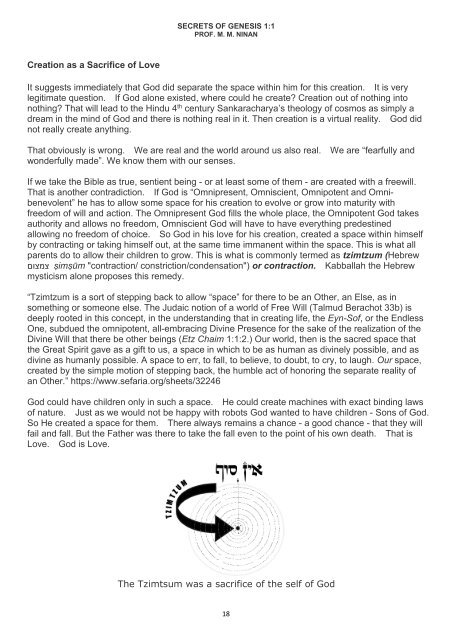Secrets of Gen 1.1
Create successful ePaper yourself
Turn your PDF publications into a flip-book with our unique Google optimized e-Paper software.
SECRETS OF GENESIS 1:1<br />
PROF. M. M. NINAN<br />
Creation as a Sacrifice <strong>of</strong> Love<br />
It suggests immediately that God did separate the space within him for this creation. It is very<br />
legitimate question. If God alone existed, where could he create? Creation out <strong>of</strong> nothing into<br />
nothing? That will lead to the Hindu 4 th century Sankaracharya’s theology <strong>of</strong> cosmos as simply a<br />
dream in the mind <strong>of</strong> God and there is nothing real in it. Then creation is a virtual reality. God did<br />
not really create anything.<br />
That obviously is wrong. We are real and the world around us also real. We are “fearfully and<br />
wonderfully made”. We know them with our senses.<br />
If we take the Bible as true, sentient being - or at least some <strong>of</strong> them - are created with a freewill.<br />
That is another contradiction. If God is “Omnipresent, Omniscient, Omnipotent and Omnibenevolent”<br />
he has to allow some space for his creation to evolve or grow into maturity with<br />
freedom <strong>of</strong> will and action. The Omnipresent God fills the whole place, the Omnipotent God takes<br />
authority and allows no freedom, Omniscient God will have to have everything predestined<br />
allowing no freedom <strong>of</strong> choice. So God in his love for his creation, created a space within himself<br />
by contracting or taking himself out, at the same time immanent within the space. This is what all<br />
parents do to allow their children to grow. This is what is commonly termed as tzimtzum (Hebrew<br />
ṣimṣūm "contraction/ constriction/condensation") or contraction. Kabballah the Hebrew צמצום<br />
mysticism alone proposes this remedy.<br />
“Tzimtzum is a sort <strong>of</strong> stepping back to allow “space” for there to be an Other, an Else, as in<br />
something or someone else. The Judaic notion <strong>of</strong> a world <strong>of</strong> Free Will (Talmud Berachot 33b) is<br />
deeply rooted in this concept, in the understanding that in creating life, the Eyn-S<strong>of</strong>, or the Endless<br />
One, subdued the omnipotent, all-embracing Divine Presence for the sake <strong>of</strong> the realization <strong>of</strong> the<br />
Divine Will that there be other beings (Etz Chaim 1:1:2.) Our world, then is the sacred space that<br />
the Great Spirit gave as a gift to us, a space in which to be as human as divinely possible, and as<br />
divine as humanly possible. A space to err, to fall, to believe, to doubt, to cry, to laugh. Our space,<br />
created by the simple motion <strong>of</strong> stepping back, the humble act <strong>of</strong> honoring the separate reality <strong>of</strong><br />
an Other.” https://www.sefaria.org/sheets/32246<br />
God could have children only in such a space. He could create machines with exact binding laws<br />
<strong>of</strong> nature. Just as we would not be happy with robots God wanted to have children - Sons <strong>of</strong> God.<br />
So He created a space for them. There always remains a chance - a good chance - that they will<br />
fail and fall. But the Father was there to take the fall even to the point <strong>of</strong> his own death. That is<br />
Love. God is Love.<br />
The Tzimtsum was a sacrifice <strong>of</strong> the self <strong>of</strong> God<br />
18

















